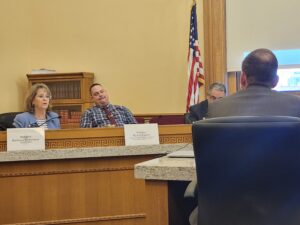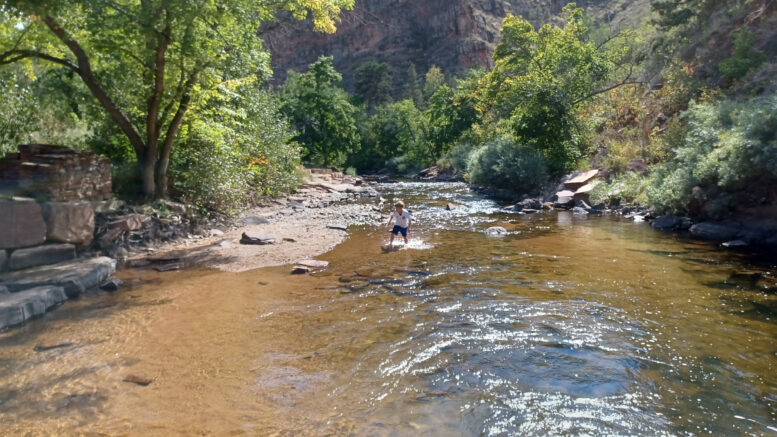Colorado legislators sent to Gov. Jared Polis on Monday a bill to create a new dredge-and-fill permitting program that fused together parts of separate water bills backed by the business and environmental communities and ended up getting heavy General Assembly support.
House Bill 1379 steps in to take over from the federal government the duties of regulating any activity involving the digging up or filling of materials into wetlands or surface waters as part of construction projects. The move became necessary after the U.S. Supreme Court ruled in March 2023 that the scope of national waters regulated by the Clean Water Act were narrower than they’d been interpreted to be, leaving 60% of Colorado wetlands without oversight beyond a temporarily erected state program.
HB 1379, sponsored by Democratic House Speaker Julie McCluskie of Dillon and Democratic Rep. Karen McCormick of Longmont originally was in direct competition with Senate Bill 127, sponsored by Sen. Barbara Kirkmeyer, R-Brighton. While SB 127 set up a gap program designed only to regulate waters that had been subject to U.S. Army Corps of Engineers permitting, HB 1379 increased the portfolio of regulated waterways by 25%, leaving some observers concerned that it could slow permitting and development.
How negotiations on water bills came about
Though it was assumed Democrats would back HB 1379, Kirkmeyer got SB 127 out of the Senate Agriculture & Natural Resources Committee when she agreed to an amendment by Sen. Janice Marchman, D-Loveland, to put the new program in the Colorado Department of Public Health and Environment rather than the Department of Natural Resources. Then the Senate Finance Committee approved it unanimously despite its substantially larger fiscal note than HB 1327 — $3.8 million, as opposed to $600,000 — after Kirkmeyer and Colorado Water Congress leaders argued that the smaller number wasn’t realistic.
Sponsors of the two bills then began serious negotiations about mixing and matching parts from their proposals to come up with a consensus water-permitting bill, and they fused the two in the Senate Finance Committee on Friday night. That led Colorado Water Congress leaders to go from fighting HB 1379 to backing it, saying the reconstituted version both offers wetland protection and safeguards against permitting delays that could threaten the state’s push to construct more housing quickly.

Colorado state Sens. Barbara Kirkmeyer and Byron Pelton listen as natural-resources attorney Adam DeVoe testifies on Kirkmeyer’s Senate Bill 127 on April 11.
“This bill now provides certainty for Coloradans and, more importantly, this bill will protect our critical streams and wetlands,” Kirkmeyer said in a news release following the vote, which also added her as a cosponsor to HB 1379. “It’s important that we do this right. And I believe this bill helps lay the foundation to ensure that we do this right.”
Some of the strongest concerns from business leaders about HB 1379 surrounded the bill’s setting up the new permitting program within CDPHE’s Water Quality Control Division. Adam DeVoe, a Denver attorney representing Legacy Water, told the Senate Finance Committee that WQCD’s discharge permitting program is backlogged by 15 years and in danger of losing its permitting authorization from the U.S. Environmental Protection Agency, setting up a “recipe for delay” if it were to get another new program to oversee.
Changes designed to streamline permitting
The changes to HB 1379 require the division to issue a statewide general permit for isolated ephemeral waters, isolated wetlands and isolated ponds and impoundments. Though all those types of waterways will be newly regulated after being untouched by the Army Corps of Engineers, having them under a statewide general permit will lessen some oversight.
HB 1379 also now requires the WQCD to issue state general permits to all projects currently under federal nationwide permits by the end of 2024, providing more immediate coverage for them. Meanwhile, it extends the rulemaking deadline for the Water Quality Control Commission to set up the new permitting system until December 2025, giving it more time for stakeholder engagement.

Colorado state Reps. Karen McCormick and Julie McCluskie explain their dredge-and-fill permitting bill to the House in April.
Finally, on the crucial issue of permit delays, the bill sits a two-year deadline for the issuance of more complex individual permits, which is a tighter timeframe than that which the federal program used. And it requires the WQCD to report to the Legislature on program expenditures and permit productivity, not only granting elected officials more oversight on the new program but allowing it to step in and boost funding from its current $600,000 allowance if necessary.
“There is no more important resource to our state and no more pressing challenge that we will face as a state in the decades to come than protecting our water,” cosponsoring Sen. Dylan Roberts, D-Frisco, said in a release after the bill’s 33-0 Senate approval on Monday. “This bipartisan bill will protect streams, rivers and wetlands that are vital to Colorado by creating a new Colorado-based permitting program to implement proven best practices for dredge and fill activities with key protections for agriculture and other crucial industry.”
Water joins issues that have been subject of bipartisan deals
With the changes, the fight over how to permit such activities joined a growing list of issues this session in which officials with differing approaches came together to reach consensus. Just since the start of last week, similar deals have been consummated on air-quality regulations focused on oil and gas, the issue of raising noneconomic damage caps on lawsuits and the question of how to reduce property taxes in the long term.
HB 1379 didn’t get unanimous backing in the House, but it did pass by a 52-11 margin that was significantly wider than the total by which it passed before it was rewritten.
“This is a very strong bipartisan bill that’s going to do wondrous things for our state,” McCormick said just before that final vote.
